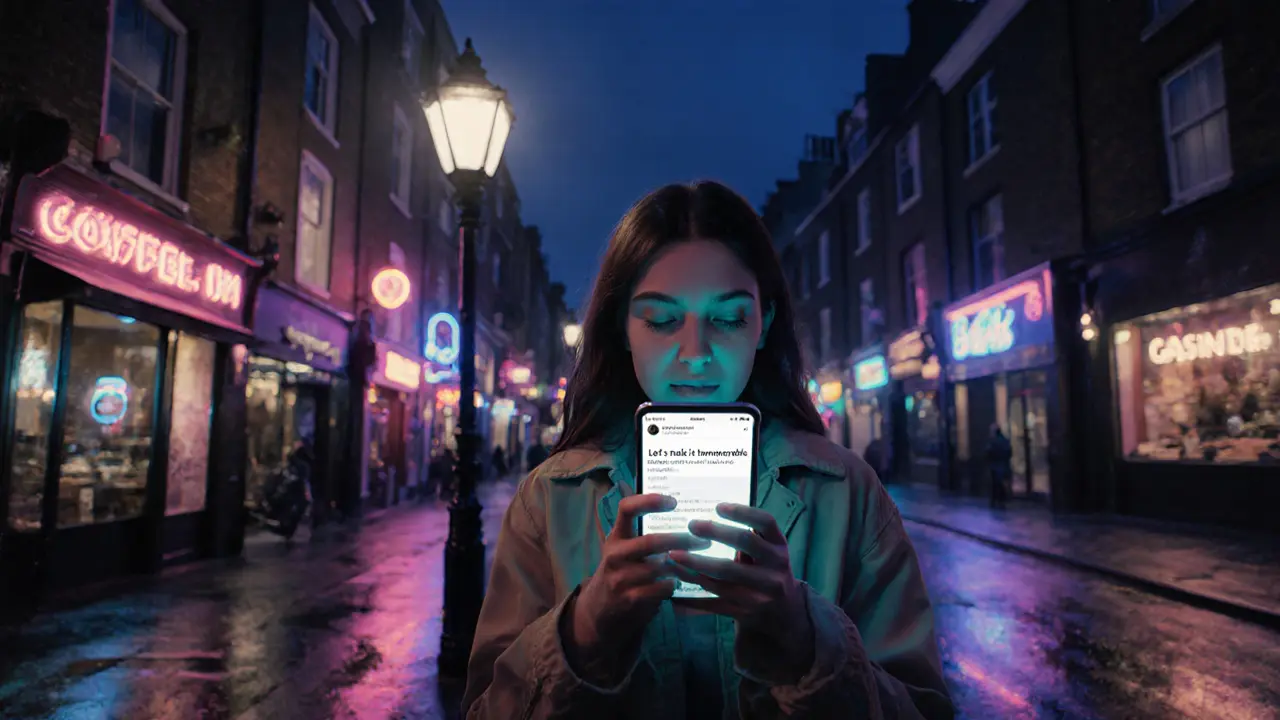Before you picture modern apps and Instagram DMs, escort services in London were hidden in plain sight-inside drawing rooms, back alleys of Mayfair, and secret societies that operated under the guise of companionship. The truth? Escort work has always been here, just never called what it is today. What changed wasn’t the demand, but the rules, the technology, and the stigma.
1800s: The Gentleman’s Companion
In Victorian London, escorting wasn’t called escorting. It was ‘lady’s companionship.’ Wealthy men paid women to attend balls, travel abroad, or simply sit quietly while they read the newspaper. These women weren’t necessarily sex workers-they were often widows or daughters of fallen gentry with no inheritance. The line between companionship and intimacy was blurred, but legally, it was untouched. The 1885 Criminal Law Amendment Act made prostitution illegal, but it didn’t touch companionship. So the business kept going, quietly, under polite names.
Madams ran these operations from townhouses in Belgravia and Kensington. Clients were listed in private directories, not public ones. Names like ‘Miss Eleanor’ or ‘Lady M.’ were used to protect identities. The most successful operators kept records of clients’ preferences-favorite drinks, music, even which hand they preferred to hold. This attention to detail became the foundation of what we now call personalized service.
1920s-1960s: The Rise of the ‘Call Girl’
After World War II, London changed. Soldiers returned, women entered the workforce, and social norms cracked open. The term ‘call girl’ emerged-not from slang, but from actual phone calls. Women began advertising in classifieds under ‘companion’ or ‘secretarial services.’ The first known escort agency in London, established in 1952 in St. James’s, used a switchboard operator to screen clients. No photos. No addresses. Just a name, a time, and a location.
Police turned a blind eye as long as no overt solicitation occurred. Escorts worked in hotels, private flats, or even rented rooms above bookshops. The most famous case? The 1963 Profumo Affair, where a call girl named Christine Keeler connected a government minister to a Soviet spy. The scandal didn’t shut down the industry-it exposed it. Suddenly, escorting wasn’t just a quiet trade. It was political.
1980s-2000s: The Underground Network
By the 1980s, escort services moved from phone lines to fax machines and early bulletin boards. Magazines like London Life and City Nights carried discreet ads with PO boxes. Women still used pseudonyms, but now they had portfolios-handwritten bios, references, even testimonials. Payment was cash-only. Many worked alone, renting rooms by the hour in flats around Notting Hill or Chelsea.
Then came the internet. In 1999, the first London-based escort website launched. It looked like a travel blog: photos of coffee shops, park walks, and smiling women in casual clothes. The real service was hidden in the fine print. Clients had to email for access. The site didn’t mention sex. It mentioned ‘time together,’ ‘conversation,’ ‘company.’ This was the birth of GFE-‘girlfriend experience’-a term that didn’t exist a decade earlier.
By 2005, over 200 escort websites operated in London. Many were run by women themselves, using home computers and free hosting services. The industry had become decentralized. No madams. No agencies. Just women controlling their own schedules, prices, and boundaries. It was the first time in history that escorting in London was truly self-managed.

2010s-2020s: Apps, Algorithms, and Accountability
Today, if you search for escort services in London, you won’t find a website. You’ll find Instagram profiles, Telegram channels, and private Discord servers. The old classified ads are gone. In their place: curated content. Women post photos of brunches, art galleries, and rooftop bars. The service isn’t advertised-it’s implied. A caption like ‘London after dark, let’s make it memorable’ is all it takes.
Payment is digital: PayPal, Revolut, or cryptocurrency. No cash. No receipts. No paper trail. Many use encrypted apps like Signal to coordinate meetings. Some even offer virtual sessions-video calls for companionship, advice, or just someone to listen. The demand for emotional connection has grown faster than physical intimacy.
Legal gray areas remain. The UK doesn’t criminalize selling sex, but it bans brothel-keeping, soliciting in public, and advertising for sexual services. So agencies don’t exist. Women work solo. And the platforms? They’re not escort sites. They’re ‘social networking’ or ‘local experience’ platforms. The law hasn’t caught up.
Recent data from the London Metropolitan Police shows a 40% drop in street-based solicitation since 2018-but a 120% increase in online reports of unlicensed escort activity. The industry didn’t disappear. It went digital. And it’s more diverse than ever. Women, non-binary individuals, and even men now offer escort services. Age ranges stretch from early 20s to late 50s. Clients include CEOs, students, expats, and retirees.
What’s Driving the Change?
Three things: technology, autonomy, and shifting attitudes.
Technology made it possible to work without intermediaries. No more madams taking half your earnings. No more landlords threatening eviction. Now, you can set your own hours, choose your clients, and walk away if something feels off.
Autonomy is the biggest draw. Many women say they chose this work because it pays better than retail, offers flexibility no 9-to-5 can match, and lets them control their own boundaries. One woman in her 40s, who works in Hampstead and has been doing this for 12 years, told a journalist in 2023: ‘I don’t sell sex. I sell my time. And I decide what that time looks like.’
Attitudes are changing too. Younger generations don’t see escorting as shameful. They see it as a service job-like tutoring, pet sitting, or personal training. The stigma hasn’t vanished, but it’s thinner. Social media has helped. Women are speaking openly about their work. Some even run YouTube channels about financial independence and boundary-setting.

Challenges Still Present
But it’s not all freedom. Safety remains a concern. Online platforms offer anonymity-but also predators. Women report fake profiles, blackmail attempts, and clients who ignore agreed terms. No legal recourse exists if a client refuses to pay or becomes aggressive. The police won’t intervene unless there’s violence or coercion.
Financial access is another issue. Banks often freeze accounts linked to escort work, calling it ‘high risk.’ Many use crypto or prepaid cards. Some rely on fintech apps designed for gig workers, but even those have restrictions.
And while the industry is more open, public perception lags. News headlines still focus on exploitation, not empowerment. Few recognize that most workers are educated, intentional, and in control. The narrative needs to shift-from criminal to client.
The Future: Regulation or Revolution?
There are calls for regulation. Some advocates want escorting to be decriminalized like in New Zealand-where workers can legally advertise, form collectives, and report abuse without fear. Others push for licensing, health checks, and mandatory safety training. But most women in the industry oppose this. They don’t want to be regulated. They want to be left alone.
The real future of escort services in London won’t be written in parliament. It’ll be written in DMs, in encrypted chats, and in quiet apartments where someone chooses to show up-not for money, but for connection. The business has evolved from drawing rooms to apps, but the core hasn’t changed: people still want to be seen, heard, and陪伴.
London’s escort industry isn’t going away. It’s just getting smarter.
Is it legal to be an escort in London?
Yes, selling sexual services is legal in London, but related activities are not. You can’t run a brothel, solicit in public, or advertise for sex. Most escorts work solo, using private communication channels to avoid breaking the law. The legal gray area is intentional-it’s how the industry survives without formal recognition.
How do modern escorts in London find clients?
Most use private social media accounts-Instagram, Telegram, or private forums. They post lifestyle content: coffee dates, museum visits, walks in Hyde Park. Clients reach out via direct message. No websites, no phone numbers, no public listings. This keeps them off police radar and gives them full control over who they meet.
What’s the difference between an escort and a sex worker?
The term ‘escort’ often implies companionship beyond sex-conversation, travel, emotional support. Many escorts set clear boundaries and don’t offer sex at all. ‘Sex worker’ is a broader term that includes strippers, cam models, and brothel workers. In London, many who identify as escorts reject the ‘sex worker’ label because they see their work as service, not sexual labor.
Do escorts in London earn good money?
Earnings vary widely. Solo escorts in central London typically charge £150-£500 per hour, depending on experience, appearance, and services offered. Some make £5,000-£15,000 a month working 15-20 hours. Many treat it as a side hustle, others as a full-time career. It’s not glamorous, but it’s often more profitable than traditional jobs with less flexibility.
Are there male escorts in London?
Yes. Male escorts have been part of London’s scene since the 1980s, but they’ve become more visible since 2015. Many serve LGBTQ+ clients, older women, or corporate professionals seeking discreet companionship. Their rates are similar to female escorts, and they use the same private platforms. Gender doesn’t define the service-it’s about connection.
Why do people use escort services in London?
People use escorts for many reasons: loneliness, lack of social skills, cultural isolation, or simply wanting to be with someone who listens without judgment. It’s not always about sex. Many clients say they pay for honesty, presence, and the absence of expectation. In a city of 9 million people, that’s rare.




